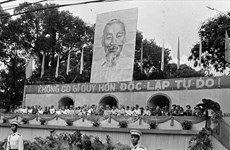ASEAN, WB launch development report
ASEAN and the World Bank have jointly launched a report on conflict,
security and development, saying conflict and insecurity affect
development of millions worldwide, and capable and accountable
institutions that can provide citizen security, justice and jobs are
crucial to prevent violence.
ASEAN and the World Bank have jointly launched a report on conflict,
security and development, saying conflict and insecurity affect
development of millions worldwide, and capable and accountable
institutions that can provide citizen security, justice and jobs are
crucial to prevent violence.
At apress conference held after the launching in Jakarta on May 4, ASEAN Secretary General Surin Pitsuwan said the report is a result of two-years efforts made to try to understand the relations between conflict, security and development and ASEAN is privileged to be part of the efforts.
The WB Development Report 2011: Conflict, Security and Development, prepared in consultation with the ASEAN Secretariat, provides that there are around 1.5 billion people living in countries affected by political and criminal violence, which caused human misery and disrupting development.
The report finds no low-income fragile or conflict-affected country has yet to achieve a single Millennium Development Goal, in the meantime, children living in fragile states are twice as likely to be undernourished, and three times as likely to be out of school.
It also also shows how organised violence in the 21 st century is provoked by a range of domestic and international stresses, including youth unemployment; income shocks, tension among ethnic, religious or social groups and organised crime and trafficking network.
To break these cycles, legitimate institutions are needed to mediate the stressed that lead to these repeated waves of violence, said Sarah Ciffe, the WB’s Co-Director and Special Representative for the World Development Report, stressing that national and global leaders need better ways to respond to calls for security, job and justice in the most fragile situations.
Good examples of the combination of local and national leadership, regional assistance and global support can be seen in the efforts to restore stability in Timor Leste after the 2006 violence, Aceh, a special region of Indonesia, after the peace agreement, and in Myanmar following cyclone Nargis.
In the three examples, ASEAN, the Association of Southeast Nations, played a regional role in addressing cultural sensitivities and smoothing the path of outside assistance, according to Dr. Surin.
“What ASEAN’s experience has shown, and what the 2011 World Development Report illustrates, is that an alliance of local, national, regional and global groups can help build the strong institutions that are essential to providing citizen security, justice and jobs,” said the ASEAN Secretary General.
The development report, which follows a speech delivered by WB President Robert B. Zoellick in 2008 to the International Institute for Strategic Studies, entitled “Fragile States: Securing Development,” is going to be launched worldwide, and to be used as a roadmap into the future of the WB, Dr. Surin said./.
At apress conference held after the launching in Jakarta on May 4, ASEAN Secretary General Surin Pitsuwan said the report is a result of two-years efforts made to try to understand the relations between conflict, security and development and ASEAN is privileged to be part of the efforts.
The WB Development Report 2011: Conflict, Security and Development, prepared in consultation with the ASEAN Secretariat, provides that there are around 1.5 billion people living in countries affected by political and criminal violence, which caused human misery and disrupting development.
The report finds no low-income fragile or conflict-affected country has yet to achieve a single Millennium Development Goal, in the meantime, children living in fragile states are twice as likely to be undernourished, and three times as likely to be out of school.
It also also shows how organised violence in the 21 st century is provoked by a range of domestic and international stresses, including youth unemployment; income shocks, tension among ethnic, religious or social groups and organised crime and trafficking network.
To break these cycles, legitimate institutions are needed to mediate the stressed that lead to these repeated waves of violence, said Sarah Ciffe, the WB’s Co-Director and Special Representative for the World Development Report, stressing that national and global leaders need better ways to respond to calls for security, job and justice in the most fragile situations.
Good examples of the combination of local and national leadership, regional assistance and global support can be seen in the efforts to restore stability in Timor Leste after the 2006 violence, Aceh, a special region of Indonesia, after the peace agreement, and in Myanmar following cyclone Nargis.
In the three examples, ASEAN, the Association of Southeast Nations, played a regional role in addressing cultural sensitivities and smoothing the path of outside assistance, according to Dr. Surin.
“What ASEAN’s experience has shown, and what the 2011 World Development Report illustrates, is that an alliance of local, national, regional and global groups can help build the strong institutions that are essential to providing citizen security, justice and jobs,” said the ASEAN Secretary General.
The development report, which follows a speech delivered by WB President Robert B. Zoellick in 2008 to the International Institute for Strategic Studies, entitled “Fragile States: Securing Development,” is going to be launched worldwide, and to be used as a roadmap into the future of the WB, Dr. Surin said./.












